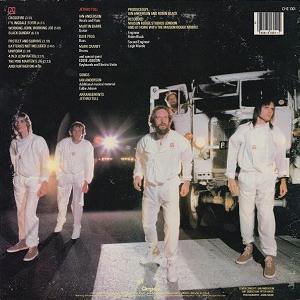A
by Jethro Tull


Artist:
Jethro Tull
Label:
Chrysalis
Catalog#:
CHE 1301
Format:
Vinyl
Country:
United States
Released:
1980
| Tracklist | |||
| A1 | Crossfire | 3:51 | |
| A2 | Fylingdale Flyer | 4:27 | |
| A3 | Working John, Working Joe | 5:01 | |
| A4 | Black Sunday | 6:33 | |
| B1 | Protect And Survive | 3:22 | |
| B2 | Batteries Not Included | 3:47 | |
| B3 | Uniform | 3:30 | |
| B4 | 4.W.D. (Low Ratio) | 3:37 | |
| B5 | The Pine Marten's Jig | 3:23 | |
| B6 | And Further On | 4:19 | |
Credits
Producer - Ian Anderson
Producer - Robin Black
Strawberry Bricks Entry:
Originally intended to be an Ian Anderson solo album (hence the title), Anderson and guitarist Martin Barre were forced to dump the previous lot of the band in order to present the new lineup that recorded the album as Jethro Tull. Bassist Dave Pegg marks his debut on the record, along with American Mark Craney on drums, who at the time was best known for his work with Tommy Bolin and Jean-Luc Ponty. But the real change is the addition of keyboard and violin wiz Eddie Jobson; fresh from a defunct U.K., who had opened for Tull's previous US tour in 1979. Thus constituted, the group went in a new direction on A—even if it was only under record company pressure that it was released as a Tull album. As the record begins, the first sound heard is Jobson's electronic piano that opens "Crossfire." Immediately, there's a different sonority from the tried-and-true Tull formula of the past, one replacing piano and organ with a palette of digital keyboards. But with shifting time signatures and processed multi-tracked vocals as further evidenced on the high-flying "Flyingdale Flyer" and the complex "Black Sunday," the album still sounds like Jethro Tull. After all, solo album or not, it was all written by Anderson. Released as a single, "Working John, Working Joe" b/w "Flyingdale Flyer" benefits from Jobson's keyboards, as does the quick-tempo "Batteries Not Included." Pegg's bass tone is decidedly modern (for 1980), while "Uniform" adds some of Jobson's violin for more than good measure. Overall the album offers a contemporary edge for Jethro Tull, one that even pulls the traditional "The Pine Marten's Jig" from disaster. However, the album's reception was tepid; it dropped out of the Top 20 in the UK to No. 25, and reached only No. 30 in the US. The band toured through the balance of the year and into 1981.

